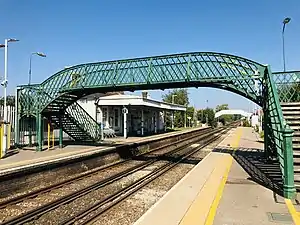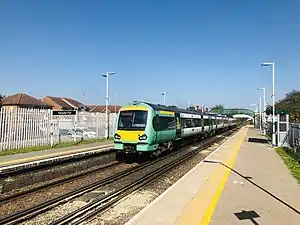Hampden Park railway station
Hampden Park railway station serves Hampden Park in the northern areas of the seaside town of Eastbourne in East Sussex. It is on the East Coastway Line, and train services are provided by Southern. Opened on 1 January 1888, it was originally called Willingdon, but was renamed Hampden Park for Willingdon on 1 July 1903. The name became Hampden Park under British Railways.[1] It is one of two stations serving Eastbourne, the other being Eastbourne railway station
Hampden Park | |
|---|---|
 The platforms at Hampden Park, looking north | |
| General information | |
| Location | Hampden Park, Eastbourne England |
| Coordinates | 50.796°N 0.279°E |
| Grid reference | TQ607021 |
| Managed by | Southern |
| Platforms | 2 |
| Other information | |
| Station code | HMD |
| Classification | DfT category E |
| History | |
| Original company | London, Brighton and South Coast Railway |
| Pre-grouping | London, Brighton and South Coast Railway |
| Post-grouping | Southern Railway |
| Key dates | |
| 1 January 1888 | Opened as Willingdon |
| 1 July 1903 | renamed Hampden Park for Willingdon |
| ? | Renamed Hampden Park |
| Passengers | |
| 2017/18 | |
| 2018/19 | |
| 2019/20 | |
| Interchange | 0.164 million |
| 2020/21 | |
| Interchange | |
| 2021/22 | |
| Interchange | |
| Notes | |
Passenger statistics from the Office of Rail and Road | |
The station is located on a spur line originally termed the Eastbourne Branch.[2] There was a rarely used triangular junction between Polegate and the now-closed Stone Cross which allowed trains to bypass the Branch; the track has now been lifted. Services along the coast have almost invariably served Eastbourne, and as Eastbourne is at the end of the spur line, the trains pass through Hampden Park station twice - once on the way to Eastbourne, and once on the way out of Eastbourne - although not all trains stop on both occasions. Because of this arrangement, some connections are advertised to allow passengers on the Victoria-Eastbourne service to use Hampden Park to pick up the stopping service to Hastings and vice versa.
The level crossing at Hampden Park is thought to be one of the busiest in the country,[3] with an average of sixteen train movements an hour off-peak, and this can lead to significant traffic congestion on adjacent roads. The signal box which controlled the crossing was abolished in February 2015 when the controls were transferred to Three Bridges Regional Operations Centre.
Services

The typical Monday-Friday off-peak service pattern is:
- 2tph to London Victoria (of which one stops here before Eastbourne and one stops after Eastbourne);
- 2tph to Brighton (one of which stops both before and after Eastbourne, and the other only after Eastbourne);
- 2tph to Ore (stopping after Eastbourne);
- 1tph to Ashford International (stopping after Eastbourne);
- 2tph to Eastbourne only.
| Preceding station | Following station | |||
|---|---|---|---|---|
| Polegate | Southern East Coastway line |
Eastbourne | ||
| Pevensey & Westham | ||||
Accessibility
Multiple travel databases - including Passenger Assist, the assistance travel app for disabled people - instruct disabled people travelling between Kent and Sussex to change trains at Hampden Park station. However this station has a large footbridge and no lift. The only step-free crossing point is a level crossing some streets away. This ‘solution’ is suggested by apps even when other stations - eg Eastbourne - are entered into the ‘Via’ field. Travellers need to be aware that Hampden Park is not accessible to wheelchairs or mobility aids in general.
References
- Butt, R.V.J. (1995). The Directory of Railway Stations. Yeovil: Patrick Stephens Ltd. pp. 251, 113. ISBN 1-85260-508-1. R508.
- Handbook of Stations ... on the Railways of Great Britain and Ireland British Transport Commission (Railway Clearing House) 1956
- "Level crossing warnings at Hampden Park". Eastbourne Herald. Johnston Press Digital Publishing. 16 December 2009. Archived from the original on 23 January 2010. Retrieved 3 March 2010.
External links
- Train times and station information for Hampden Park railway station from National Rail